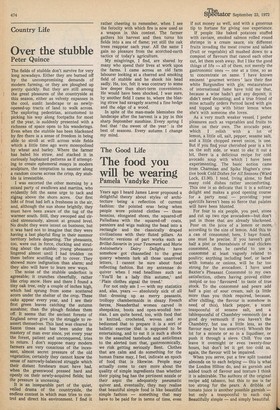Country Life
Over the stubble
Peter Quince
The fields of stubble don't survive for very long nowadays. Either they are burned off by the uncompromising demands of modern farming, or they are ploughed up pretty quickly. But they are still among the great pleasures of the countryside at this season, either as velvety expanses in the cool, sunlit landscape or as newlyopened-up tracts of land to walk across. The exploring pedestrian, accustomed to picking his way along footpaths for most of the year, is suddenly presented with a richness of space open to his wanderings. Even when the stubble has been blackened by fire there is a sense of freedom in being able to stroll at will across wide fields which a little time ago were monopolised by wheat and barley. Where the farmer has baled his straw, and stacked it in curiously haphazard patterns as if attempting to create ephemeral essays in modern sculpture, the temptation to saunter along a random course across the crisp, dry stubble is irresistible.
I was escorted the other morning by a mixed party of swallows and martins, who evidently felt the same urge to tack and zigzag above the shorn acres. Our first hiht of frost had left a freshness in the air, and, although the sun shone brightly, they must have been aware of the tug of the warmer south. Still, they swooped and circled strenuously, almost at ground level. No doubt they were intent on business, but it was hard not to imagine that they were having a last playful fling in their summer territory before departing. The pheasants, too, were out in force, clucking and strutting about the stubble; young pheasants lingered almost until I had trodden on them before scuttling off to cover. They showed more indignation than alarm; and they also will have to learn new ways.
The noise of the stubble underfoot is agreeable; it crunches cheerfully, rather like crisp snow. Here and there I found a tiny oak tree, only a couple of inches high, which had sprung from some scattered acorn under the shelter of the crop. These oaks appear every year, and I see their first green leaves catching the autumn sunshine; than the plough finishes them off. It seems that the ancient forests of England never give up the struggle to reassert themselves. This land was cleared in Saxon times and has been under the mastery of man ever since, yet every year the forest, patient and unconquered, tries to return. I don't suppose many modern farmers are very conscious of the incessant, almost secret pressure of the old vegetation; certainly they cannot know the sense of narrowly-balanced struggle which their distant forebears must have had, when the greenwood pressed hard and openly on their newly-acquired fields; but the pressure is unceasing.
It is an inseparable part of the quiet, veiled drama of the countryside, the endless contest in which man tries to control and direct his environment. I find it rather cheering to remember, when I see the ferocity with which fire is now used as a weapon in this contest. The farmer gathers his harvest and then turns his fields into a sea of flame; yet still the oak trees reappear each year. All the same I gain no pleasure from the scorched-earth tactics of today's agriculture.
My misgivings, I find, are shared by many who spend their lives at work upon the farms. I came across an old farm labourer looking at a charred and smoking field of stubble and he shook his head sadly. He, too, felt it was contrary to some law deeper than short-term convenience. He would have been shocked, I was sure, by another field I came to, where the blazing straw had savagely scarred a fine hedge and the edge of a wood.
In spite of the man-made blemishes the landscape after the harvest is a joy in this sharp September sunshine. Every spring I feel that the sweet of the year' is the best of seasons. Every autumn I change my mind.


































 Previous page
Previous page